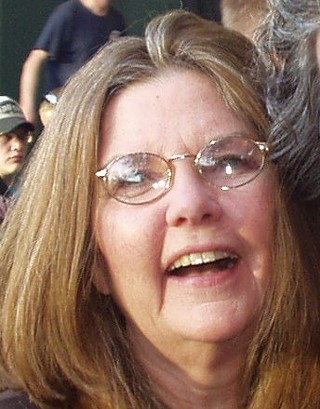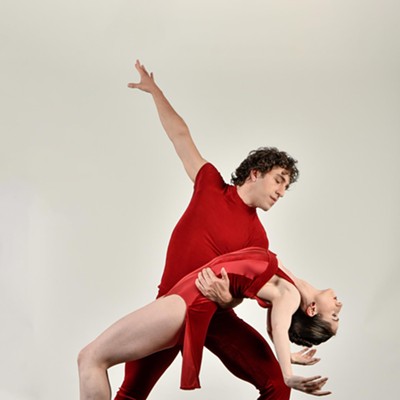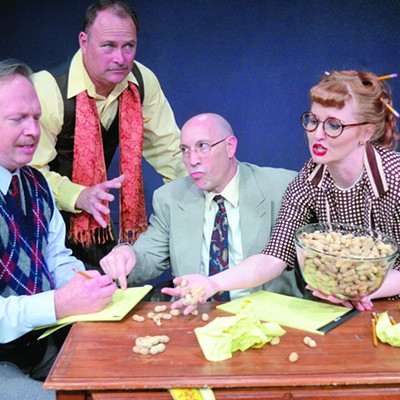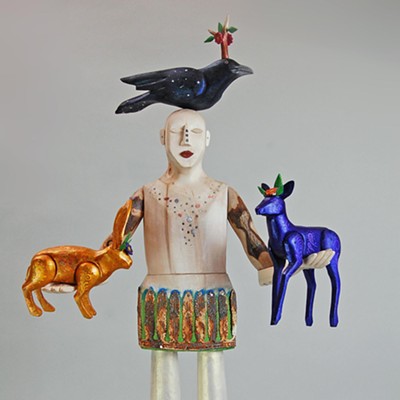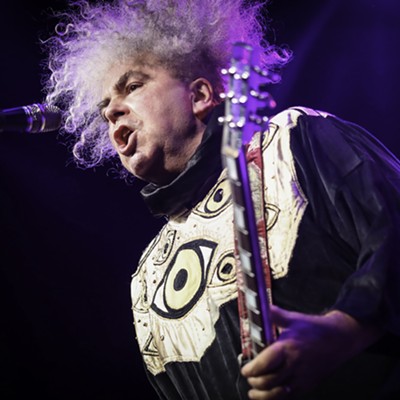The Car Talk guys come to mind, for instance. Who'd have thought auto drivel could make such hilarious entertainment? Magic tricks were relegated to children's birthday parties and Berkshire resorts until David Copperfield "disappeared" the Statue of Liberty. Political commentary was a drag before Molly Ivins. And at age 60-something, Don Walser popularized the art of country yodeling--in goth/punk nightclubs.
Andrew Bird is just such a phenomenon.
A virtuoso violinist, he's also explored and conquered the vast and exponentially expanding world of electronics to enthrall rock audiences, filling ever larger venues to capacity with his one-man show. His performances are as accessible as they are technically proficient, and seemingly endlessly inventive, but perhaps his most singular contribution to contemporary music is this: He whistles.
Bird whistles like he sings, and he sings with the fluidity of a violin, which he's played since age 4. It's as much a part of him as his fingers and teeth, and he takes it for granted accordingly.
After earning a music degree from Northwestern University, Bird made three records referencing much of the most interesting music made in Western culture during the last three centuries. Now that he's processed all that, he's fairly certain the music he's creating now no longer represents received notions.
For all of that, and notwithstanding his considerable charisma, he's remarkably humble and low-key. As a result, he's been rather slow in adapting to the pace of his own success, which arguably accelerated when, in 2005, Ani DiFranco released his record and then took him on tour with her. "I had started touring at a very economy level, and it took a while to catch up with how things were changing," Bird says via telephone from his Chicago pied à terre. "After eight or nine years of being on the road, I'd show up at clubs, and I'd see all these people lined up, and I'd go, 'Where are all these people going? Oh damn. There must be something else going on tonight.'
"There was more pressure involved, and I still didn't have a tour manager or any crew or anything. But I eventually figured that out, which made things much easier. I got some help, finally."
Predictably, extensive touring has taken its toll on Bird's sense of place. "I'm accustomed to wondering, 'Should I just forget this whole idea of home?' But I've kind of concluded that it's necessary to have one even if you're not there, just symbolically, I guess. I do feel like my community is getting kind of spread out amongst different cities, so Chicago started to seem sort of an arbitrary place that I call home. And it just seems sometimes too much work to have the expectations of home."
Still, a home offers the benefit of being able to leave it. "I definitely in the past really enjoyed the act of leaving, whether it's Chicago or any other city I've been in. For some reason, ideas just flood into me as I'm looking in the rearview mirror."
Lately, he's been seeing Minneapolis a lot in his rearview mirror. He's acquired a sympathetic touring and recording partner in Minneapolis percussionist and solo artist Martin Dosh. Bird recorded his upcoming album in Minneapolis and stocked the sessions with musicians Dosh recommended.
"Martin's had a pretty profound effect on the show and the next record (due in April 2007). He's a performer in his own right, and he has a solo thing similar to what I do, but he's more into the underground, electronic, hip-hop scene. He loops all of his drums and keyboards through his own mixer, so we've been having a lot of fun combining both of those elements and even writing songs together."
As a result, fans can expect Bird's new music to have somewhat different energy. "I listened to (the 2005) Mysterious Production of Eggs, and I (thought), 'That sounds very restrained compared to the new stuff, (which is) a lot wilder.'"
Bird's writing process has changed, too. "I think over the years that my creative process has gone from writing 25 different songs to writing eight or nine songs 25 different ways. Before when I was inspired by records and the history of music, I was running around ... grabbing all these different albums and being really active. That's less the case now. That lack of spark from the outside is something I still struggle with. You have to rely on some moment of extreme confidence to really get things rolling."
This is not to say he has no outside stimuli, or that he's lost his interest in history. His muse has merely ambled over to the realm of social anthropology. "I've been getting myself into ancient history and maps. That's actually popping up on a lot of the newer songs. I'm fascinated by civilizations that have come and gone, and were never that mighty or spectacular. I'm into the lesser, weirder corners of history."
Tucson audiences will get a preview of this new material, and its new sound, at the Rialto Theatre on Sept. 19, when Bird performs with Dosh. "There are so many variables of how each song could go. Martin is pulling out random stuff every night, and I respond to that--there's a lot of back and forth. Every night, pretty much without fail, I'm surprised by what happens.
"That's my ultimate goal--at the end of a show to be like, 'Wow! We made something new.'"

